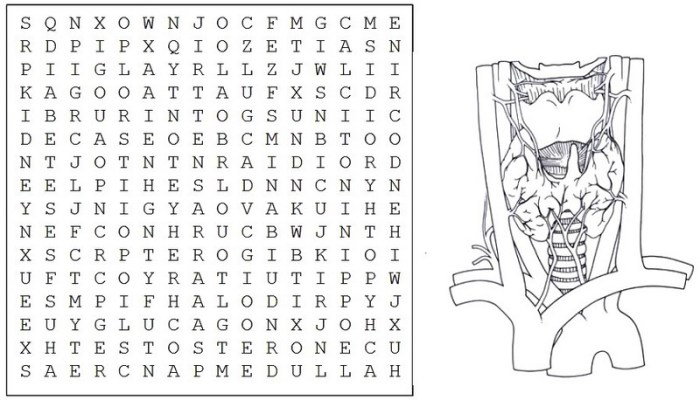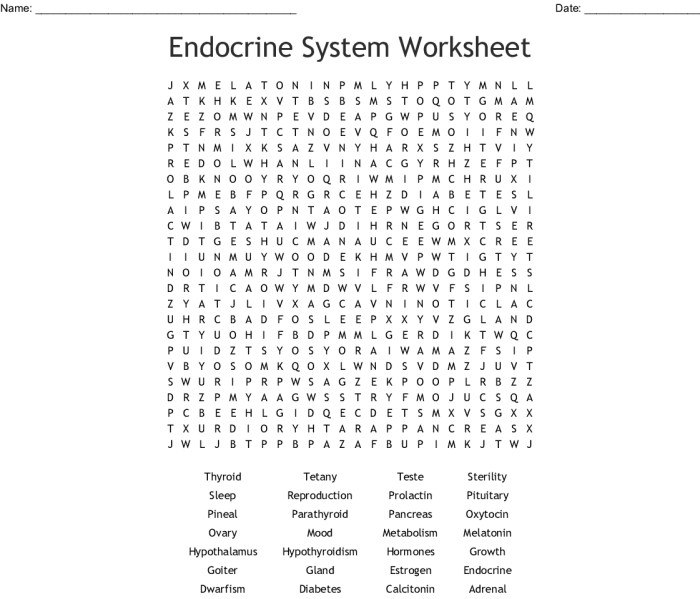Welcome to the world of endocrine system word search answers, where learning about the intricate hormonal network of our bodies becomes an engaging and interactive experience. Dive into a word puzzle filled with terms related to the endocrine system, and embark on a journey to uncover the functions, glands, and regulation of this vital system.
Our bodies are governed by a complex system of glands and hormones that play a crucial role in regulating metabolism, growth, reproduction, and mood. Understanding the endocrine system is essential for maintaining optimal health and well-being.
Definitions and Functions
The endocrine system is a complex network of glands that secrete hormones into the bloodstream. These hormones act as chemical messengers, traveling throughout the body to target specific cells and tissues. The endocrine system plays a crucial role in regulating a wide range of bodily functions, including metabolism, growth, reproduction, and mood.The
major components of the endocrine system include:
- The pituitary gland
- The thyroid gland
- The parathyroid glands
- The adrenal glands
- The pancreas
- The ovaries (in females)
- The testes (in males)
Each gland produces and secretes specific hormones that have unique functions. For example, the pituitary gland secretes growth hormone, which stimulates growth and development. The thyroid gland secretes thyroid hormones, which regulate metabolism. The adrenal glands secrete adrenaline, which prepares the body for “fight or flight” responses.The
endocrine system works in conjunction with the nervous system to maintain homeostasis, the body’s internal balance. Hormones can influence the activity of the nervous system, and the nervous system can stimulate or inhibit the release of hormones. This complex interplay ensures that the body’s functions are coordinated and regulated in a balanced manner.
Endocrine Glands

The endocrine system consists of specialized glands that secrete hormones directly into the bloodstream. These hormones travel throughout the body and regulate a wide range of physiological processes, including metabolism, growth, reproduction, and mood.
The major endocrine glands and their locations are as follows:
- Pituitary gland: Located at the base of the brain, the pituitary gland is often referred to as the “master gland” because it controls the activity of other endocrine glands.
- Thyroid gland: Located in the neck, the thyroid gland secretes hormones that regulate metabolism.
- Parathyroid glands: Located near the thyroid gland, the parathyroid glands secrete hormones that regulate calcium levels in the blood.
- Adrenal glands: Located on top of the kidneys, the adrenal glands secrete hormones that regulate stress responses and blood pressure.
- Pancreas: Located behind the stomach, the pancreas secretes hormones that regulate blood sugar levels.
- Ovaries: Located in women, the ovaries secrete hormones that regulate the menstrual cycle and reproduction.
- Testes: Located in men, the testes secrete hormones that regulate male sexual development and reproduction.
The hormones secreted by each gland have specific target organs where they exert their effects. For example, the pituitary gland secretes growth hormone, which targets cells throughout the body to promote growth. The thyroid gland secretes thyroxine, which targets cells in the body to increase metabolism.
The adrenal glands secrete cortisol, which targets cells in the body to prepare for stress responses.
Hormone Regulation: Endocrine System Word Search Answers
Hormone regulation is a complex process that involves multiple mechanisms to ensure the proper functioning of the endocrine system. These mechanisms include feedback loops, which allow for precise control of hormone levels in the body.
Feedback Loops
Feedback loops are regulatory mechanisms that use negative or positive feedback to maintain homeostasis. In negative feedback loops, the output of a system inhibits the input, preventing overproduction of a hormone. In contrast, positive feedback loops amplify the output, promoting further production of a hormone.
An example of a negative feedback loop in the endocrine system is the regulation of thyroid hormone. When thyroid hormone levels in the blood are high, it inhibits the release of thyroid-stimulating hormone (TSH) from the pituitary gland. TSH stimulates the thyroid gland to produce thyroid hormone.
Thus, when thyroid hormone levels are high, TSH levels decrease, leading to a decrease in thyroid hormone production.
Role of the Hypothalamus and Pituitary Gland
The hypothalamus and pituitary gland play a central role in hormone control. The hypothalamus produces releasing hormones that stimulate the pituitary gland to release specific hormones. The pituitary gland then releases these hormones into the bloodstream, where they target specific tissues and organs.
The hypothalamus acts as a link between the nervous system and the endocrine system. It monitors various physiological conditions, such as blood pressure, body temperature, and stress levels, and adjusts hormone production accordingly. The pituitary gland, also known as the “master gland,” receives signals from the hypothalamus and releases hormones that regulate other endocrine glands.
Endocrine Disorders

Endocrine disorders are a group of conditions that affect the endocrine system, which is responsible for producing and regulating hormones. These disorders can range from mild to severe and can affect people of all ages.
Some of the most common endocrine disorders include:
- Diabetes
- Thyroid disorders
- Cushing’s syndrome
Diabetes
Diabetes is a chronic disease that affects the way the body uses sugar (glucose). There are two main types of diabetes:
- Type 1 diabetes is an autoimmune disease in which the body’s immune system attacks and destroys the cells in the pancreas that produce insulin.
- Type 2 diabetes is a condition in which the body does not make enough insulin or does not use insulin well.
Symptoms of diabetes can include:
- Increased thirst
- Frequent urination
- Unexplained weight loss
- Fatigue
- Blurred vision
Treatment for diabetes involves managing blood sugar levels through diet, exercise, and medication.
Thyroid Disorders, Endocrine system word search answers
Thyroid disorders are a group of conditions that affect the thyroid gland, which is responsible for producing thyroid hormones. These hormones regulate metabolism, growth, and development.
Some of the most common thyroid disorders include:
- Hypothyroidism is a condition in which the thyroid gland does not produce enough thyroid hormones.
- Hyperthyroidism is a condition in which the thyroid gland produces too much thyroid hormones.
Symptoms of hypothyroidism can include:
- Fatigue
- Weight gain
- Constipation
- Dry skin
- Brittle hair
Symptoms of hyperthyroidism can include:
- Weight loss
- Increased heart rate
- Nervousness
- Sweating
- Diarrhea
Treatment for thyroid disorders involves medication to regulate thyroid hormone levels.
Cushing’s Syndrome
Cushing’s syndrome is a condition in which the body is exposed to high levels of the hormone cortisol. This can be caused by a tumor on the adrenal glands or by taking certain medications, such as steroids.
Symptoms of Cushing’s syndrome can include:
- Weight gain
- High blood pressure
- Diabetes
- Osteoporosis
- Mood changes
Treatment for Cushing’s syndrome involves surgery to remove the tumor or medication to reduce cortisol levels.
Word Search Answers
The word search puzzle below contains terms related to the endocrine system. The words can be found horizontally, vertically, or diagonally.
Instructions:Find the words in the puzzle. Circle or highlight each word as you find it.
| A | D | R | E | N | A | L | G | L | A | N | D |
| P | I | T | U | I | T | A | R | Y | G | L | A |
| I | N | S | U | L | I | N | H | Y | P | O | P |
| T | H | Y | R | O | I | D | G | L | A | N | D |
| U | Y | P | O | P | H | Y | S | I | S | G | L |
| I | T | A | R | Y | G | L | A | N | D | S | P |
| T | A | R | G | E | T | F | A | C | T | O | R |
| A | D | R | E | N | A | L | G | L | A | N | D |
| R | E | L | E | A | S | I | N | G | H | Y | P |
| O | P | A | N | C | R | E | A | S | I | S | G |
| I | N | S | U | L | I | N | H | Y | P | O | P |
| T | H | Y | R | O | I | D | G | L | A | N | D |
Word List
- Adrenal– A gland that produces hormones that regulate blood pressure, heart rate, and metabolism.
- Estrogen– A hormone that is responsible for the development of female secondary sexual characteristics.
- Growth hormone– A hormone that stimulates growth in children and adolescents.
- Insulin– A hormone that regulates blood sugar levels.
- Pancreas– An organ that produces insulin and glucagon.
- Parathyroid– A gland that produces hormones that regulate calcium levels in the blood.
- Pituitary– A gland that produces hormones that regulate growth, metabolism, and reproduction.
- Progesterone– A hormone that is responsible for preparing the uterus for pregnancy.
- Testosterone– A hormone that is responsible for the development of male secondary sexual characteristics.
- Thyroid– A gland that produces hormones that regulate metabolism.
Top FAQs
What is the endocrine system?
The endocrine system is a network of glands that secrete hormones directly into the bloodstream, regulating various bodily functions.
What are the major endocrine glands?
The major endocrine glands include the pituitary gland, thyroid gland, adrenal glands, pancreas, and ovaries (in females) and testes (in males).
How are hormones regulated?
Hormones are regulated through feedback loops, where the levels of a hormone in the bloodstream influence its own production or the production of other hormones.